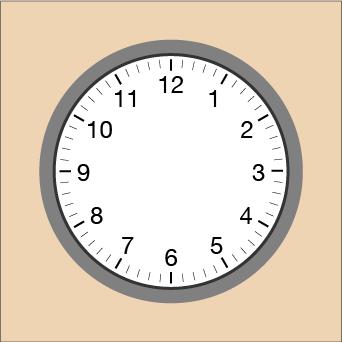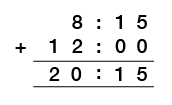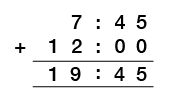6 Time
What’s the difference between the 12-hour clock and the 24-hour clock?
| 12-hour clock | 24-hour clock |
|---|---|
The hours go from 12 to 12, twice a day You must use ‘a.m.’ or ‘p.m.’: ‘a.m.’ means ‘before noon’ and ‘p.m.’ means ‘after noon’ | The hours go from 0 to 23 Time is always shown in four digits You do not use ‘a.m.’ or ‘p.m.’ Commonly used in timetables, mobile phones and computers |
Example: Converting times before noon
It is easy to change from the 12-hour clock to the 24-hour clock for times before noon (or times ending ‘a.m.’). So for example, ‘4:25 a.m.’ would be written as ‘04:25’. ‘11:35 a.m.’ would be ‘11:35’.
(Note that many timetables don’t show the colon in the 24-hour clock, so these times would be shown as ‘0425’ or ‘1135’.)
How would you write a quarter to eight in the morning as a 24-hour clock time?
Method
Fifteen minutes before eight o’clock is the same as 45 minutes past 7, so it is written as 07:45.
To change from the 12-hour clock to 24-hour clock for times after noon (ending ‘p.m.’), you usually need to add 12 hours.
Example: Converting times after noon
- How would you express 8:15 p.m. using the 24-hour clock?
- How would you write quarter to eight in the evening as a 24-hour clock time?
Method
- You need to add 12 hours:
So 8:15 p.m. is 20:15 in a 24-hour clock.
- You add 12 hours:
So 7:45 p.m. is 19:45 in a 24-hour clock.
Hint: Take care with times with the hour of 12. So quarter past midnight, or 12:15 a.m. is 00:15 in a 24-hour clock. Likewise quarter past midday, or 12:15 p.m., is 12:15 in a 24-hour clock.
Now try the following activity.
Activity 20: The 24-hour clock

Express the following times in the 24-hour clock. Remember, for some of the times you will need to use the method of adding on 12 hours to convert the time intothe 24-hour format. You could use Figure 44 to help you count on 12 hours.
- 8:15 a.m.
- 2:50 p.m.
- 5:40 a.m.
- 9:22 p.m.
- Ten to ten in the morning
- Five past six in the evening
Answer
- 08:15
- 14:50
- 05:40
- 21:22
- 09:50
- 18:05


